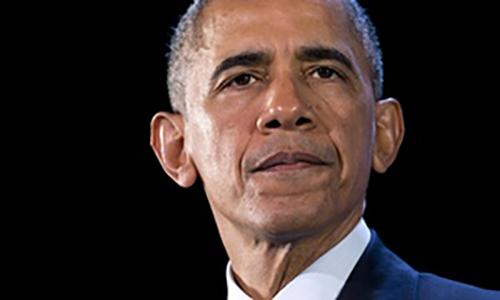Republicans clash with Obama over Syria refugee program
US lawmakers moved Wednesday to freeze White House plans to resettle Syrian refugees, intensifying a standoff with President Barack Obama who accused Republicans of "hysteria" following the Paris attacks.
Seizing upon fears one of the attackers may have entered Europe posing as a Syrian migrant, Republican leaders introduced legislation requiring assurances of more robust background checks and vetting before the White House can go ahead with its plan to welcome 10,000 refugees from the conflict in the coming year.
A vote on the measure, unveiled by House Homeland Security chairman Michael McCaul, could come Thursday.
"It does put the brakes on the program until they can properly vet and certify that these individuals do not pose a threat to the national security of the United States," McCaul said.
The bill is aimed at strengthening vetting procedures for Syrian as well as Iraqi refugees in the wake of Friday's attacks that killed 129 people in Paris.
"I don't think we can afford to play Russian roulette with our national security," McCaul said.
Amid intensifying concern over extremists from the Islamic State group infiltrating the West, and as US lawmakers digest reports that several Paris attackers were French nationals, McCaul said lawmakers were also drafting legislation that would tighten the existing visa waiver program.
The program allows citizens of certain countries, including France and others in Europe, to travel to the United States without a visa.
"Obviously that's a vulnerability when you have 5,000 foreign fighters with Western passports. We need to tighten up those security gaps," McCaul said.
In an unusually fierce rebuke on the refugee issue, Obama struck out at Republicans, accusing them of demonizing "widows and orphans."
"We are not well served when in response to a terrorist attack we descend into fear and panic," Obama said Wednesday from Manila.
"We don't make good decisions if it's based on hysteria or an exaggeration of risks."
Congress is under extraordinary pressure to act after at least 27 US state governors voiced opposition to taking in further Syrian refugees.
McCaul's plan would require the director of the FBI, the Secretary of Homeland Security and the Director of National Intelligence to certify that each refugee is not a security threat.
"With that comes great liability," declared McCaul.
Once the top officials sign off on a determination that a refugee is not a security threat, "they own it, it's their responsibility," McCaul added.
House Speaker Paul Ryan backs the bill, telling colleagues that it would pause the refugee program until it was certain "beyond any doubt" that the new Syrian and Iraqi settlers do not pose a threat.
"Our first priority is to protect the American people," he said. "We can be compassionate, and we can also be safe."
Senator John McCain, a foreign policy hawk, said he supported a pause but offered a word of caution.
"I believe the overwhelming focus on the refugee program in recent days is misplaced," he said. "I especially encourage my fellow Republicans to recognize that refugees are not the problem –- they are the symptom of the problem."
- 'More comfortable' -
The White House held a 90-minute call with a bipartisan group of 34 governors, urging them to avoid measures that would block Middle Eastern refugees from entering the country.
Should the House legislation pass Congress it could be a major roadblock for Obama's resettlement program.
The president insisted the screening in place was enough to weed out jihadists and keep Americans safe.
Keeping it operating would promote American values, he argued.
"America can ensure our own security while welcoming refugees desperately seeking safety from ISIL," Obama said on Twitter, using an acronym for the Islamic State group.
But his "hysteria" remark rankled Republicans.
"To speak down to someone because they have a concern... it just doesn't help. It hurts," Senate Foreign Relations Committee chairman Bob Corker said.
After listening to a closed-door briefing by administration officials, some Republican senators said they felt reassured about the robust nature of the current refugee vetting process.
"I do feel more comfortable" about it, Senator Jeff Flake said.
While the administration defended the checks carried out in refugee camps in Egypt, Jordan and Turkey -- vetting that typically takes 18 to 24 months -- CIA director John Brennan said it was important to intensify refugee scrutiny.
Brennan said he wanted to work with international partners "to see what we can do to strengthen that system that allows us to have as best insight as possible into the background of these individuals."
More than four million Syrians have fled their homeland since the war began.
Between October 1, 2011 and November 14 of this year, the United States admitted 2,159 Syrian refugees, according to the State Department.
Related Posts

